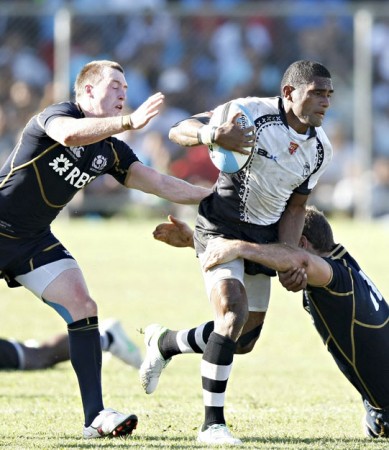
History kicks: Greig Laidlaw kicks the winning penalty for Scotland's first win in Australia for 30 years
By Alan Dymock
IN A summer where the myopic slant was to denounce the Northern Hemisphere as out of touch with their southern hemisphere counterparts, there was an odd feeling of glee in Scotland. The national side had not only recorded a three match series win south of the equator, but they had also broken the mould.
First up to face one of the big three, taking on a midweek Australia side in new surroundings, Scotland played what was in front of them and won. Some from the other home nations would proffer that the Australia side they faced was weakened in certain areas or that the tropical downpour affected the 9-6 result, but this would be a miserly summation.
Scotland had no control over the conditions or how much respect the Australian selectors paid them. Instead they exerted their own control and closed out a tight game in conditions that nearly rendered rugby defunct.
The huge scalp they claimed was not only a fillip for a side who had two near disastrous campaigns fresh in the memory, but it was one that stood tall amongst all of the other home nations’ records.
Scotland were the only team to defeat one of the top three nations in the world this summer.
Bolstered by their obdurate win the Scots took what they needed from Australia and headed for their real summer targets: the Pacific Islands who held the key to Scotland’s world ranking and consequent seedings for the 2015 Rugby World Cup draw in December.
So Scotland headed to Fiji, well aware of how the IRB world rankings worked. More of a coefficient can be nurtured if you score points against a team in their own country and the higher the ranking the more value these wins hold. After beating Australia, the world’s number two, Scotland had points and more importantly, confidence.
They struggled with the heat of Fiji and their camp was hit with illness, but Scotland took out their target. They kept their heads when thundering hits were thrown at them and took the points when on offer. Scotland were, at times, drawn into Fiji’s own flying type of game, which resulted in conceding some tries from broken play, but quality counted and the result was a positive one. They won 37-25 and saw new cap Tim Visser steal the headlines with a neat brace of tries.
After this they took to Samoa, a stronger team and one in ninth place in the world rankings, a place ahead of Scotland.
A much sterner ask than Fiji, Samoa had more recognisable names and something to fight for. This was the pinnacle of the tour and something that had been built towards.
Scotland laboured and wrestled with their hosts, trying to play their own fierce defensive game in unfamiliar heat against opponents capable of bludgeon and slick handling. In the end it took a battered Scottish unit to trudge up the park and settle for a last gasp try from debutant Rob Harley to win a tight game.
Scotland achieved their goal, winning all of their games, but more than this they did something different. As a Tier One nation they embarked on an all-too-rare tour of Fiji and Samoa. They built ties and took new tests. They even capped some young players and found an enigmatic star in Visser, who repaid selectors with endeavour and tries.
This tour must be looked upon as a huge success. Not just because of the results, but because Scotland stood apart from the rest. Of course they won three valuable test matches, but they blazed a new trail.







